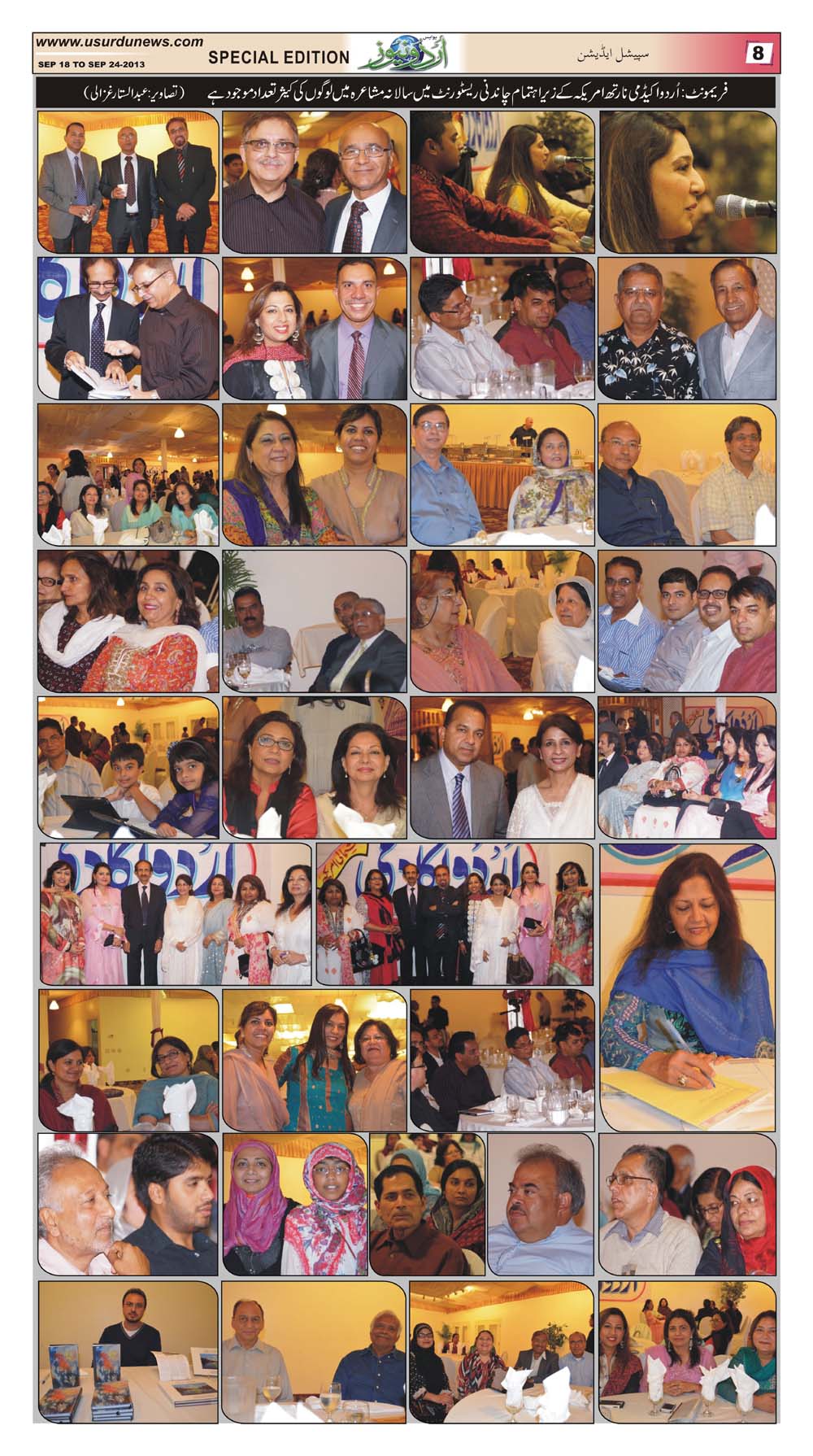|
Another Mushaera Magic of the Urdu Academy of North America
By Abdus Sattar Ghazali
Dil Laga Lete HaiN Ahl-e-Dil Watan Koi Bhee Ho
Phool Ko Khilne Se Matlab He Chaman Koi Bhee Ho
The Urdu Academy of North America's 2013 annual mushaera began with this touching verse of Basir Kazmi MBE who follows the ghazal tradition of his illustrious father, the late Nasir Kazmi. This emotional verse reflects the sentiments of the Urdu speaking Diaspora in North America and Europe.
Basir Kazmi, now settled in UK, flew from Manchester to preside over the 'Urdu Poetical Symposium' held on September 15, 2013 at the Chandni Restaurant in Fremont/Newark CA.
The galaxy of poets included Fayyaz Uddin Saieb, Rehana Qamar, Khalid Khaja and Nasim Farogh. The host or local poets included Tashie Zaheer, Farooq Taraz , Ahmar Shehwar, Arshad Rasheed, Lubna Manzar, Misbah Rehman, Salam Siddiq, Syed Misum Moosavi and Waqar Khan.
Rehana Qamar, belongs to the town of Toba Tek Singh, famed by Sa’adat Hasan Manto’s popular short story named after this town. Rehana Qamar now lives in Los Angeles. She is the author of seven books and serves Urdu under the banner of Bazm-e-Taraqqi-e-Urdu.
Khalid Khaja from Modesto has his own style of poetic presentation.
Nasim Farogh from Maryland is very popular for his humorous and witty poetry.
Ahmar Shehwar and Tashie Zaheer read maqalas on the work of Basir Kazmi.
It is said that we don't read and write poetry because it's cute. We read and write poetry because we are members of the human race and the human race is filled with passion. The English poet and playwright Christopher Fry describes poetry as the language in which man explores his own amazement. Poetry is a type of communication and expressiveness in a written form. Poetry liberates one from sufferings, oppression and suppression on one hand, while revealing love, happiness and pleasure on the other.
Perhaps the importance of poetry is best revealed by the English poet John Keats: “Poetry should... should strike the reader as a wording of his own highest thoughts, and appear almost a remembrance.”
I dare to say that Basir Kazmi’s creation meets this criteria about poetry which is just another way to express one’s thoughtfulness and desires.
Basir Sultan Kazmi publications include a collection of Urdu poetry collection, Moj-e-Khayal (1997), and translations of ghazals in A Little Bridge (1997), Generations of Ghazals (2003) and in several magazines and anthologies. His Urdu play, Bisaat, was published in 1987 and its translation, The Chess Board, in 1997. He won the North West Playwrights Workshop Award in 1992. His plays have been performed in northern theatres.
Born in Pakistan (1955), Basir Kazmi studied and taught English Literature at the Government College, Lahore. He edited Ravi (1974) and was the office bearer of the college literary and dramatic societies. He did his M.Ed (1991) and M.Phil (2000) at Manchester University, as well as a PGCE in English (1995). He worked for the BBC's Asian Programme (1991/92) and has conducted poetry and drama workshops for many years all over the UK.
Basir Kazmi was given Member of British Empire (MBE) award in June 2013 for his services in the field of literature. He was a fellow at University of Bradford, from 2008 to 2012.
Continued on page two
|